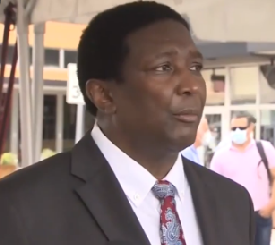Humanitarian needs of Haiti’s quake survivors still immense
PORT AU PRINCE, Haiti – The humanitarian needs of people affected by January’s earthquake in Haiti remain immense, United Nations agencies and their partners said today in a report, which also takes stock of the response effort and presents lessons learned from the challenging and complex emergency.
“It is clear that the needs are still immense, and the challenges facing the response operation potentially daunting,” said the agencies, which are members of the Inter-Agency Standing Committee (IASC), the forum for coordination, policy development and decision-making of key UN and non-UN humanitarian partners.
“Foremost amongst these challenges is shelter – working with the Government to identify durable solutions for the secure settlement of the displaced population,” they said in the publication entitled “Haiti Earthquake Response, 6-Month Report,” launched today in Haiti.
More than 200,000 people were killed in the 12 January quake, 1.3 million more were left homeless and key infrastructure was destroyed in Port-au-Prince, Haiti’s capital, and other areas.
According to the report, the most important lesson learned was the need to better understand and work more effectively with the various actors from outside the humanitarian context, including the military and the private sector.
“The global humanitarian architecture must be critically reviewed to ensure that it is not implemented in such a way as to preclude such partnerships which are critical to the most effective response,” they said.
They also noted the need for the humanitarian community to review how it should adapt to urban responses and to identify the necessary expertise, tools, knowledge, and partnerships to be able to operate effectively in such environments.
“Ensuring a better understanding of vulnerability – and what this means for humanitarian assistance strategies – is a priority for humanitarian actors. One way this can be strengthened is through learning how to communicate better with disaster-affected populations, which would lead to an improved understanding of the operating context,” they said.
They said the devastation caused by the quake was compounded by underlying vulnerabilities in Haiti, including systemic poverty, structural challenges, weak governance, and an almost annual exposure to floods, hurricanes and related disasters.
The humanitarian organisations said that despite the challenging operating environment, the relief operation largely achieved its immediate objectives and responded effectively to the critical needs identified.
Approximately four million people have so far received food assistance, emergency shelter materials have been distributed to 1.5 million people, safe water has been made available to 1.2 million people, and one million people have benefited from cash-for-work programmes.
In camps and spontaneous settlements housing approximately 1.5 million internally displaced persons (IDPs), basic services such as health clinics, educational support, and water and sanitation facilities have been provided, while joint patrolling by the UN Stabilization Mission in Haiti (MINUSTAH) and Haitian police is helping to protect the most vulnerable.
In rural areas, over 142,000 farming families have been supported with critical inputs for the spring planting season, while targeted nutritional programmes have aimed to reduce severe acute malnutrition among those affected by the earthquake.
“We have seen extraordinary strength as Haitians coped with appalling suffering with dignity, calm, and truly humbling willingness to help each other regardless of how little they have,” said Nigel Fisher, the Deputy Special Representative of the Secretary-General to Haiti and UN Humanitarian and Resident Coordinator in the country.
He said that 170,000 of the estimated 190,000 damaged houses have been assessed and will be repaired and strengthened so that people can return to them. Some 100,000 people have returned to homes that were not damaged, Mr. Fisher told reporters in New York by video link from Port-au-Prince.
In an effort to get the IDPs out of the tented camps, transitional shelters were being established and it is expected that a total of 120,000 of them will be ready by next year, he said.
In New York, Margareta Wahlström, Special Representative of the Secretary-General for Disaster Risk Reduction, said the reconstruction effort in Haiti remained daunting.
“We shall continue working with the Haitian Government and its many partners to help rebuild a safer Haiti. Hopefully, no new hospital, school or public structure will be built without integrating disaster risk reduction principles into its design and construction,” Ms. Wahlström added.
The UN High Commissioner for Refugees (UNHCR) said that most of those displaced continue to live in settlements in and around Port-au-Prince, and assistance has not adequately reached those living with host families. “Durable solutions for the displaced are still not in sight,” spokesperson Adrian Edwards told reporters in Geneva.
The UN Children’s Fund (UNICEF), for its part, said there were continuing challenges to meet the needs of more than 800,000 affected children and their families.
“The earthquake in Haiti was a disaster for children and it isn’t over yet,” said Anthony Lake, UNICEF Executive Director. “UNICEF and its partners are working hard every day to save lives and help children claim their future,” he added.
The UN Population Fund (UNFPA) said the reproductive health needs of people living in camps were being met by teams in mobile and temporary clinics, to supplement services being offered by hospitals in Port-au-Prince that were not destroyed by the earthquake.
UNFPA has been providing maternal health supplies, including birthing kits, for an estimated two million people, and had distributed 22,000 hygiene kits to the female population in temporary camps, as well as tents, mattresses and solar-powered lamps. The Fund is also supporting Haiti’s Ministry of Health and Population in implementing a temporary, national health plan developed after the earthquake.
In preparation for the upcoming rain and hurricane season, the UN World Food Programme (WFP) said it was pre-positioning food supplies in 32 locations in the most vulnerable areas across the country. The supplies will be enough to feed 1.1 million Haitians for six weeks.
John Holmes, Under-Secretary-General for Humanitarian Affairs and Emergency Relief Coordinator, arrived in Haiti today to review humanitarian progress six months after the earthquake.


